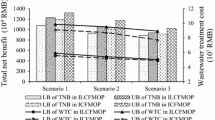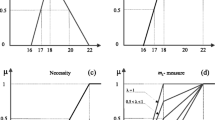Abstract
In this study, an interval-valued fuzzy linear programming with infinite α-cuts (IVFLP-I) method is developed for municipal solid waste (MSW) management under uncertainty. IVFLP-I can not only tackle uncertainties expressed as intervals and interval-valued fuzzy sets, but also take all fuzzy information into account by discretizing infinite α-cut levels to the interval-valued fuzzy membership functions. Through adoption of the interval-valued fuzzy sets, IVFLP-I can directly communicate information of waste managers’ confidence levels over various subjective judgments into the optimization process. Compared to the existing methods in which only finite α-cut levels exist, IVFLP-I would have enhanced the robustness in the optimization efforts. A MSW management problem is studied to illustrate the applicability of the proposed method. Four groups of optimal solutions can be obtained through assigning different intervals of α-cut levels. The results indicate that wider intervals of α-cut levels could lead to a lower risk level of constraint violation associated with a higher system cost; contrarily, narrower intervals of α-cut levels could lead to a lower cost with a higher risk of violating the constraints. The solutions under different intervals of α-cut levels can support in-depth analyses of tradeoffs between system costs and constraint-violation risks.








Similar content being viewed by others
References
Arey MJ, Baetz BW (1993) Simulation modeling for the sizing of solid waste receiving facilities. Can J Civil Eng 20:220–227
Cai YP, Huang GH, Nie XH, Li YP, Tan Q (2007) Municipal solid waste management under uncertainty: a mixed interval parameter fuzzy-stochastic robust programming approach. Environ Eng Sci 24(3):338–352
Cai YP, Huang GH, Lu HW, Yang ZF, Tan Q (2009) I-VFRP: An interval-valued fuzzy robust programming approach for municipal waste-management planning under uncertainty. Eng Optim 41:399–418
Chang NB, Wang SF (1997) A fuzzy goal programming approach for the optimal planning of metropolitan solid waste management systems. Eur J Oper Res 32(4):303–321
Chang NB, Chen YL, Wang SF (1997) A fuzzy interval multiobjective mixed integer programming approach for the optimal planning of solid waste management systems. Fuzzy Sets Syst 89:35–59
Chang NB, Davila E, Dyson B, Brown R (2005) Optimal design for sustainable development of a recycling facility in a fast-growing urban setting. Waste Manage 25:833–846
Chi GF, Huang GH (1998) Long-term planning of integrated solid waste management system under uncertainty. University of Regina Report submitted to the City of Regina, Saskatchewan, Canada
Delgado M, Verdegay JL, Vila MA (1989) A general model for fuzzy linear programming. Fuzzy Sets Syst 29:21–29
Dubios D, Prade H (1978) Operations on fuzzy number. Int J Syst Sci 9:613–626
Dubios D, Prade H (1999a) A synthetic view of belief revision with uncertain inputs in the framework of possibility theory. Int J Approx Reason 17(2–3):295–306
Dubios D, Prade H (1999b) On fuzzy interpolation. Int J General Syst 28(2):103–112
Dubios D, Prade H (1999c) Qualitative possibility theory and its applications to constraint satisfaction and decision under uncertainty. Int J Intell Syst 14(1):45–53
Dupacova J (1998) Reflections on robust optimization. Lecture Notes in Economics and Mathematical Systems, vol 458, pp 111–127
Fang SC, Puthenpura SC (1993) Linear Optimization and Extensions: Theory and Algorithms. Prentice Hall, Englewood Cliffs, N.J
Fang SC, Hu CF, Wang HF (1999) Linear Programming with Fuzzy Coefficients in Constraints. Comput Math Appl 37:63–76
Huang GH, Chang NB (2003) The perspectives of environmental informatics and systems analysis. J Environ Inform 1:1–6
Huang GH, Baetz BW, Patry GG (1992) A grey linear programming approach for municipal solid waste management planning under uncertainty. Civil Eng Environ Syst 9:319–335
Huang GH, Baetz BW, Patry GG (1993) A grey fuzzy linear programming approach for municipal solid waste management planning under uncertainty. Civil Eng Environ Syst 10:123–146
Huang GH, Baetz BW, Patry GG (1994a) Grey dynamic programming for solid waste management planning under uncertainty. J Urban Plan Dev 120(3):132–156
Huang GH, Baetz BW, Patry GG (1994b) Grey chance-constrained programming: application to regional solid waste management planning. In: Hipel KW, Fang L (eds). Effective environmental management for sustainable development. Kluwer Academic
Huang GH, Baetz BW, Patry GG (1995a) Grey quadratic programming and its application to municipal solid waste management planning under uncertainty. Eng Optim 23:201–223
Huang GH, Baetz BW, Patry GG (1995b) Grey integer programming: An application to waste management planning under uncertainty. Eur J Oper Res 83:594–620
Huang GH, Sae-Lim N, Chen Z, Liu L (2001) Long-term planning of waste management system in the City of Regina–An integrated inexact optimization approach. Environ Model Assess 6:285–296
Huang YF, Baetz BW, Huang GH, Liu L (2002) Violation analysis for solid waste management systems: an interval fuzzy programming approach. J Environ Manage 65:431–446
Inuiguchi M, Ichihashi H, Tanaka H (1990) Fuzzy programming: a survey of recent developments. In: Slowinski R, Teghem J (eds) Stochastic versus fuzzy approaches to multiobjective mathematical programming under uncertainty. Kluwer Academic Publishers, Dordrechts, pp 45–70
Kunjur A, Krishnamurty S (1997) A robust multi-criteria optimization approach. Mech Mach Theory 32(7):797–810
Lee YW, Bogardi I, Stansbury J (1991) Fuzzy decision making in dredged-material management. J Environ Eng 117(2):614–628
Li YP, Huang GH, Nie XH, Nie SL (2008) A two-stage fuzzy robust integer programming approach for capacity planning of environmental management systems. Eur J Oper Res 189(2):399–420
Li YP, Huang GH, Yang ZF, Chen X (2009) Inexact fuzzy-stochastic constraint-softened programming–A case study for waste management. Waste Manage 29:2165–2177
Liu L, Huang GH, Liu Y, Fuller GA (2003) A fuzzy-stochastic robust programming model for regional air quality management under uncertainty. Eng Optim 35(2):177–199
Lu HW, Huang GH, Lin YP, He L (2009a) A two-Step infinite α-cuts fuzzy linear programming method in determination of optimal allocation strategies in agricultural irrigation systems. Water Resour Manage 23:2249–2269
Lu HW, Huang GH, He L (2009b) A semi-infinite analysis-based inexact two-stage stochastic fuzzy linear programming approach for water resources management. Eng Optim 41:73–85
Luhandjula MK, Gupta MM (1996) On fuzzy stochastic optimization. Fuzzy Sets Syst 81:47–55
Luo B, Zhou DC (2007) Planning hydroelectric resources with recourse-based multistage interval-stochastic programming. Stoch Env Res Risk Assess 23:65–73
Maqsood I, Huang GH (2003) A two-stage interval-stochastic programming model for waste management under uncertainty. J Air Waste Manage Assoc 53:540–552
Maqsood I, Huang GH, Huang YF, Chen B (2005) ITOM: an interval parameter two-stage optimization mode for stochastic planning of water resources systems. Stoch Env Res Risk Assess 19(2):125–133
Nie XH, Huang GH, Li YP, Liu L (2007) IFRP: A hybrid interval-parameter fuzzy robust programming approach for waste management planning under uncertainty. J Environ Manage 84(1):1–11
Vassiadou-Zeniou C, Zenios SA (1996) Robust optimization models for managing callable bond portfolios. Eur J Oper Res 91:264–273
Yeomans JS, Huang GH (2003) An evolutionary grey, hop, skip, and jump approach: Generating alternative policies for the expansion of waste management. J Environ Inform 1:37–51
Yeomans JS, Huang GH, Yoogalingam R (2003) Combining simulation with evolutionary algorithms for optimal planning under uncertainty: an application to municipal solid waste management planning in the Regional Municipality of Hamilton–Wentworth. J Environ Inform 2:11–30
Zeng Y, Trauth KM (2005) Internet-based fuzzy multicriteria decision support system for planning integrated solid waste management. J Environ Inform 6:1–15
Acknowledgments
The research was supported by the Major State Basic Research Development Program of MOST (2005CB724207), and the Natural Sciences and Engineering Research Council of Canada. The authors are grateful to the editors and the anonymous reviewers for their insightful comments and suggestions.
Author information
Authors and Affiliations
Corresponding author
Rights and permissions
About this article
Cite this article
Wang, S., Huang, G.H., Lu, H.W. et al. An interval-valued fuzzy linear programming with infinite α-cuts method for environmental management under uncertainty. Stoch Environ Res Risk Assess 25, 211–222 (2011). https://doi.org/10.1007/s00477-010-0432-x
Published:
Issue Date:
DOI: https://doi.org/10.1007/s00477-010-0432-x




